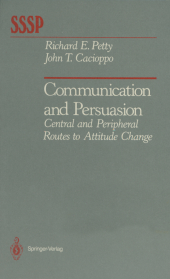 Neuerscheinungen 2012Stand: 2020-01-07 |
Schnellsuche
ISBN/Stichwort/Autor
|
Herderstraße 10
10625 Berlin
Tel.: 030 315 714 16
Fax 030 315 714 14
info@buchspektrum.de |

John T. Cacioppo, Richard E. Petty
(Beteiligte)
Communication and Persuasion
Central and Peripheral Routes to Attitude Change
Softcover reprint of the original 1st ed. 1986. 2012. xiv, 264 S. XIV, 262 pp. 40 figs. 235 mm
Verlag/Jahr: SPRINGER, BERLIN 2012
ISBN: 1-461-29378-2 (1461293782)
Neue ISBN: 978-1-461-29378-1 (9781461293781)
Preis und Lieferzeit: Bitte klicken
It has been over 10 years since we initiated work on our first series of collaborative experiments. As graduate students, we had great fun planning, conducting, and writing this research (Petty & Cacioppo, 1977). We enjoyed arguing with each other at our initial meeting in 1973 and have sub sequently become best friends, but neither of us suspected at the time that we would or could actively maintain a research collaboration over the next decade, or that we would now find ourselves in a position to write this monograph. As we note in Chapter 1, we began our studies of persuasion at a time when social psychology was in "crisis," and interest in research on attitude change in particular was declining. As we write this, we are aware of six new volumes on persuasion that are in press or in preparation and that should appear over the next few years. In retrospect, it is not so surprising that research on attitudes and persuasion would reemerge as a central concern of social psychology. We believe that human feelings, beliefs, and behaviors, whether in the domain of interpersonal relations (e. g. , marriage, aggression), politics (e. g. , voting, revolution), health (e. g. , following a medical regimen), or economics (e. g. , consumer purchases) are greatly influenced by the evaluations people have of other people, objects, and issues. Furthermore, evaluations (attitudes) are influenced by affect, cognition, and behavior.
John T. Cacioppo ist Tiffany and Margaret Blake Distinguished Service Professor und Direktor des Center for Cognitive and Social Neuroscience an der University of Chicago. Er hat das Forschungsfeld der sozialen Neurowissenschaften entscheidend mitgeprägt, war unter anderem Präsident der Association for Psychological Science und hat zahlreiche wissenschaftliche Auszeichnungen erhalten. Er lebt in Chicago.


